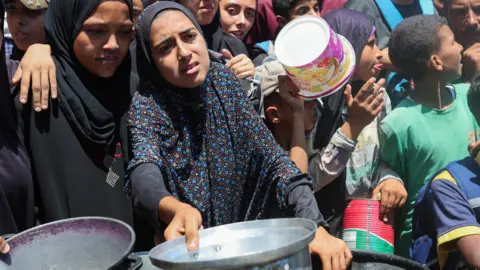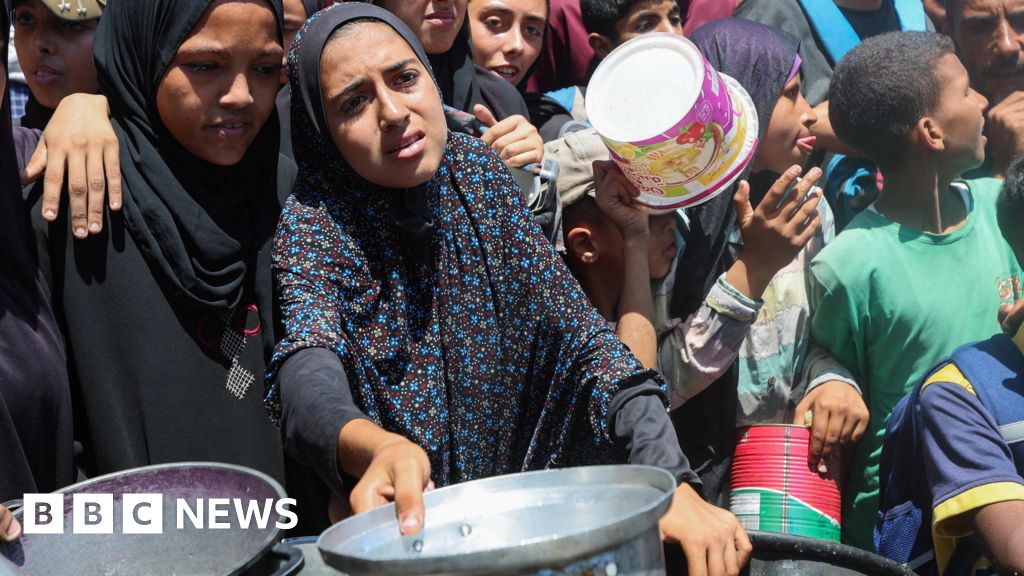 Reuters
ReutersAlmost one in three people in Gaza are going days without eating, the UN’s food aid programme has warned.
“Malnutrition is surging with 90,000 women and children in urgent need of treatment,” the World Food Programme (WFP) said in a statement to news agency AFP.
Warnings of starvation in Gaza have intensified this week. Nine more people died of malnutrition on Friday, according to the territory’s Hamas-run health ministry – bringing the total such deaths since the war began to 122.
Israel, which controls the entry of all supplies into Gaza, says there is no restriction on aid getting into the territory and blames Hamas for any malnutrition.
An Israeli security official said on Friday that airdrops of aid into Gaza could be allowed in the coming days – something aid agencies have previously cautioned is an inefficient way to get supplies into Gaza.
While local media reported the United Arab Emirates and Jordan would carry out the latest drops, a senior Jordanian official told the BBC that its military was yet to receive permission from Israel to do so.
The UN has described the move as a “distraction to inaction” by the Israeli government.
The move came amid mounting international concern about humanitarian conditions in Gaza.
On Friday, Germany, France and the UK called on Israel to “immediately lift restrictions on the flow of aid” into the territory.
In a joint statement, they called for an immediate end to the “humanitarian catastrophe that we are witnessing in Gaza,” and to the war itself, adding that Israel must “uphold its obligations under international humanitarian law”.
“Withholding essential humanitarian assistance to the civilian population is unacceptable,” read the statement.
The UN Secretary-General António Guterres said he could not “explain the level of indifference and inaction we see by too many in the international community – the lack of compassion, the lack of truth, the lack of humanity”.
Addressing the Amnesty International global assembly, he said more than 1,000 Palestinians had been killed while trying to access food since 27 May – when the US and Israeli-backed Gaza Humanitarian Foundation (GHF) began distributing supplies as an alternative to the UN-led system.
A US security contractor who worked for the GHF in May and June 2025 told the BBC on Friday that he had “without question… witnessed war crimes” during that time.
Anthony Aguilar said he saw the IDF and US contractors using live ammunition, artillery, mortar rounds, and tank fire on civilians at food distribution sites.
The retired soldier said: “In my entire career, I have never witnessed the level of brutality and use of indiscriminate and unnecessary force against a civilian population until I was in Gaza at the hands of the IDF and US contractors.”
In its response, the GHF said the claims – which came from “a disgruntled former contractor who was terminated for misconduct a month ago” – were “categorically false”.
Meanwhile, the future of talks to secure a new ceasefire and hostage-release deal remains uncertain, after the US and Israel withdrew their negotiating teams from Qatar.
US President Donald Trump said Hamas “didn’t really want to make a deal”.
“I think they want to die,” he said.
Hamas has expressed surprise about the US remarks.
A senior Hamas official also told the BBC’s Gaza correspondent that mediators had informed the group negotiations had not collapsed, and said the Israeli delegation was expected to return to Doha next week.
Israel launched a war in Gaza in response to the Hamas-led attack on southern Israel on 7 October 2023, in which about 1,200 people were killed and 251 others were taken hostage.
More than 59,000 people have been killed in Gaza since then, according to the Hamas-run health ministry.
Israel imposed a total blockade of aid deliveries at the start of March and resumed its military offensive against Hamas two weeks later, collapsing a two-month ceasefire. It said it wanted to put pressure on the group to release its remaining Israeli hostages.
Although the blockade was partially eased after almost two months amid warnings of a looming famine from global experts, the shortages of food, medicine and fuel have worsened.
Most of Gaza’s population has been displaced multiple times and more than 90% of homes are estimated to be damaged or destroyed.
On Thursday, France announced it would official recognise a Palestinian state in September – a move which angered Israel and its main ally, the US.
A day later, more than a third of UK MPs signed a letter to Prime Minister Keir Starmer calling for the UK to follow suit.
But Sir Keir indicated such a move would not be imminent – it would have to be part of a “wider plan which ultimately results in a two-state solution” – a Palestinian state alongside Israel.


